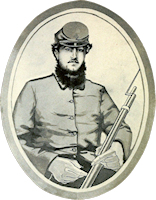HEAD QUARTER’S ANDERSON’S BRIGADE,
MAR. BUNKER’S HILL, VA.,
Sept. 29, 1862.
My Dear Mother:
It has been some time since I last wrote you. I hope you have not been uneasy about me, for I have never been in better health in my life. During the past two months we have been on the march almost constantly, sometimes resting one or two days, but never longer.
On Sunday, the 14th of September, we left our camp at 4 o’clock in the morning and marched some six miles to the top of the Blue Ridge and drew up in line of battle. We were not long waiting for the Yankees, they came in very large columns and we fought until after dark. That night our troops fell back through Boonsboro some few miles and drew up in line of battle little after sunrise, very little fighting was done on that day, only some cannonading. We continued in our position until the 17th inst., when we had almost a general engagement. The line of battle of our Brigade was some two hundred yards in front of a house in which General D. H. Hill and General Anderson had their Head Quarters. The fight commenced in the morning before I awoke (long before sunrise), soon after light the wounded from the Artillery commenced coming in, pretty soon the wounded infantry came in by the dozens. There wasn’t a surgeon on the battle field from our Brigade, but Gus Stith. He stayed there to the last. He, his two assistants and myself dressed the wounds until the Yankees got in 30 yards of the house. General Anderson was anxious to get off before the Yankees got nearer. He did not want to be taken prisoner by them. He would prefer being shot through the head, so Capt. Gales, his A. A. General, myself and two other men of the Ambulance Corps carried him through a field that looked like it was impossible for man to walk ten steps without being killed, though we got out safe. A piece of shell struck me on the knee, which occasioned some little inconvenience for a few days, but nothing else. The house in which we were was the hottest part of the battle field, we were exposed to a cross fire of two Yankee Batteries and from the front by musket balls. The house, kitchen, trees and everything else was torn and shot all to pieces. We had a large pot full of chicken on the stove, cooking for dinner, when a bomb took off one-half of the kitchen and turned the stove bottom upwards. That stopped the splendid dinner we had in preparation. You must get Gus Stith to tell you all about our campaign, adventures, etc. He can do it better than I can write it. Every day’s march through Maryland I could write a long letter, but when it is all past and forgotten I can’t think of one thing that I wished to write. If I ever live to get home I can think of one thing at a time, and tell you a great many little incidents of interest. The Northern part of Virginia and some parts of Maryland is the most beautiful country that I ever saw. I don’t know how it is in the winter, but from the looks of the soil, it’s as muddy as Manassas, I reckon. We (our company) lost several in the two battles, none killed, but some badly wounded, others taken prisoners or have not come up yet, may be wounded and left on the battlefield and had to be left in the hands of the Yankees when we fell back this side of the Potomac. We are now encamped on the Turnpike from Martinsburg to Winchester, some ten miles from the latter place.
I don’t know where to tell you to direct your next letter, Richmond, though, I reckon. Our mail for this Brigade is at Winchester, we will get that to-day. I hope to get some letters from home when it comes. I must close this so as to have it ready when Gus Stith starts, he can’t tell when, so I must have it ready. I may get something in the mail before this gets off.
Your loving son,
WALTER.
Letters from two brothers who served in the 4th North Carolina Infantry during the Civil War are available in a number of sources online. Unfortunately, the brothers are misidentified in some places as Walter Lee and George Lee when their names were actually Walter Battle and George Battle. See The Battle Brothers for more information on the misidentification.
